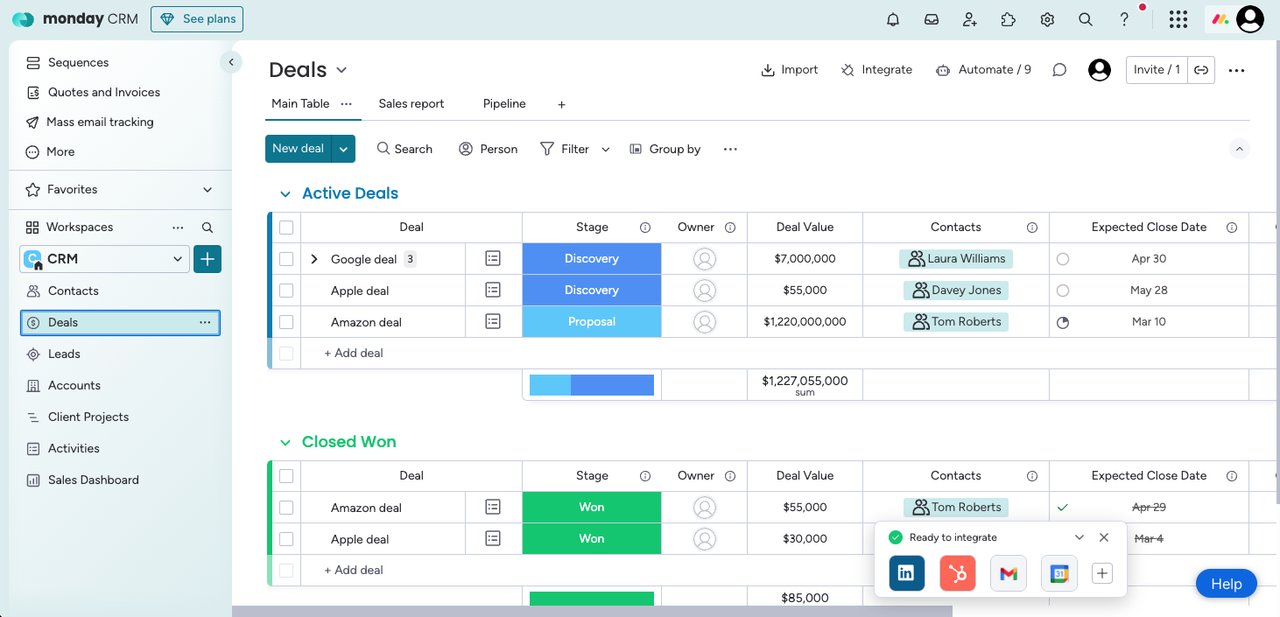
Monday CRM is a customizable sales platform that aims to streamline the entire sales cycle, from lead capture to deal closing. As part of the broader Monday.com suite of work management tools, the CRM integrates seamlessly with Monday's other offerings while also functioning well as a standalone solution.
What immediately stood out to me during my review of Monday was its playful and vibrant interface — a stark contrast to the simple spreadsheet-like design of many of the best CRM platforms. But don't let the playful exterior fool you. Under the hood, Monday CRM packs some serious power and flexibility.
The platform allows you to tailor pipelines, data fields, automations, and more to match your unique sales processes. Collaboration is a core focus, with tools for communicating with both colleagues and clients. Dashboards and reporting features give you real-time visibility into sales performance. In this in-depth review, I'll share my firsthand experience using Monday as a CRM, examining its key features, ease of use, pricing, and more to help you determine if it's the right fit for your sales team.
At TechRadar Pro, we recognize that your CRM is the engine of your business. Our experts don’t just read feature lists. We perform hands-on, multi-day testing to see how these platforms perform in the real world. For our Monday Sales CRM review, we navigated the entire user journey - from importing complex datasets to building custom automation sequences and testing the platform’s AI capabilities.
This review, like all of those we undertake, is 100% independent. We never accept payment for product rankings or positive coverage, ensuring our verdict is based solely on a platform's usability, performance, and value.
Monday.com CRM: Core capabilities
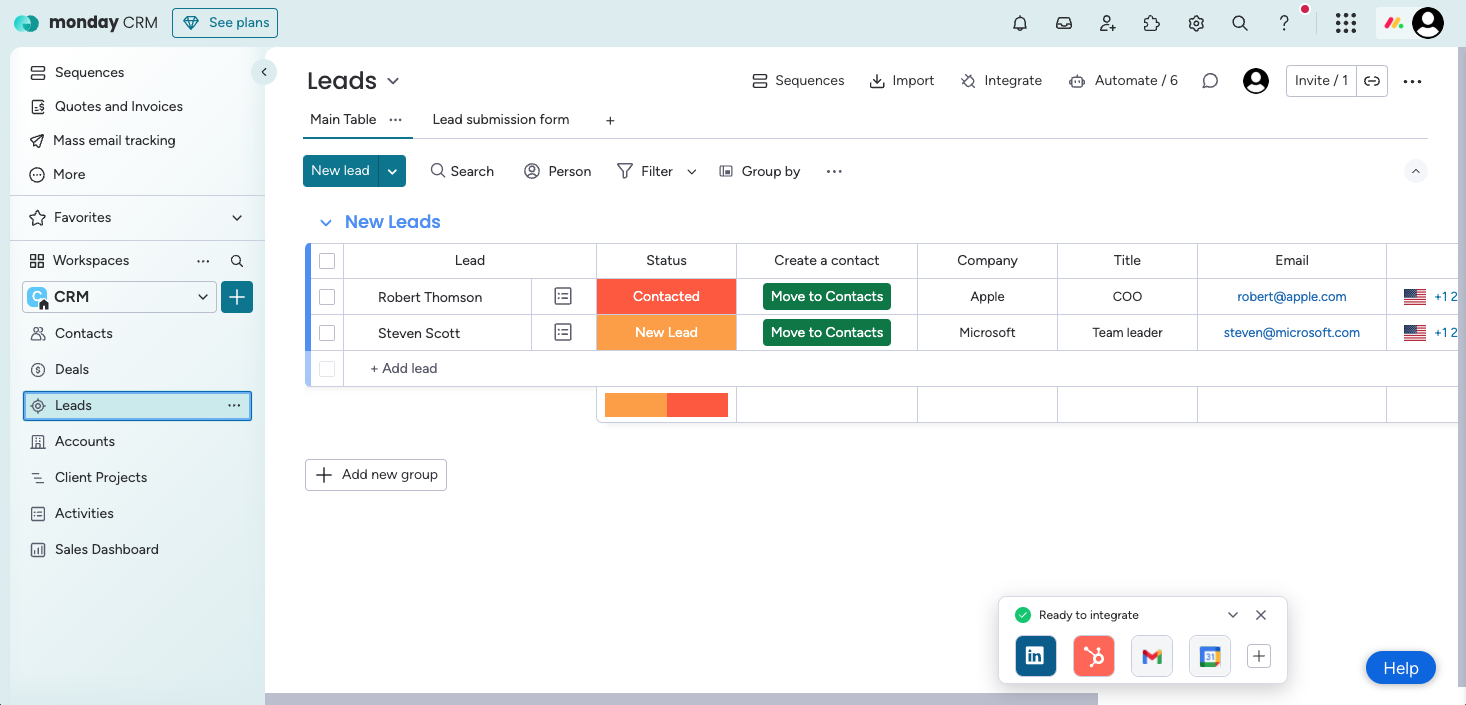
As I explored Monday’s core capabilities, I found that it provides a solid CRM foundation with contact and account management. I found it easy to centralize all customer data, including contact details, communication history, and associated deals, in one place. I liked how the ability to create detailed customer profiles helps build a 360-degree view of each account.
Capturing leads from various sources and tracking them through the sales funnel felt intuitive. I appreciated being able to customize lead stages and create multiple pipelines to match my unique sales processes. A drag-and-drop interface made it simple to move deals between stages as they progressed.
For those worried about using a workplace management platform for sales forecasting, Monday.com thankfully has you covered. By setting probability percentages for each deal stage, I could generate revenue projections and understand my pipeline's health at a glance. The ability to track actual revenue against forecasted amounts added an extra layer of insight.
Monday.com’s no-code workflow automation builder comes with templates for beginners, making it easy to implement automation without requiring extensive technical expertise. I was able to set up various automated workflows, such as assigning leads to specific team members based on criteria or sending follow-up emails after a certain period of inactivity. These automations saved considerable time and ensured consistent follow-up processes.
Monday offers a wide range of pre-built dashboards and reports covering sales activity, team performance, revenue trends, and more. I found the reports visually appealing and easy to understand and I liked the ability to drill down into individual metrics, which provided granular insights. However, I did find the report customization options somewhat limited compared to other CRMs that I've used.
Monday’s mobile app provides a dedicated on-the-go experience with access to all key features. Being able to manage my pipeline, log calls, and view reports on the go was incredibly convenient. The app's interface was intuitive and optimized for mobile, making it a seamless extension of the desktop platform.
In the last few months, Monday has also introduced a range of AI-enabled features to its CRM platform. For example, AI-powered email composition was particularly impressive, helping me draft personalized emails quickly based on context and previous communications. Another nice addition was the AI-driven insights and suggestions, such as identifying the best times to contact leads or highlighting deals that may need attention. But while these features were generally helpful, I found that the AI capabilities are still evolving, occasionally producing suggestions that weren't quite on target.
However, I did identify a few areas for improvement. The platform currently lacks some advanced features like territory management and sales coaching tools that are found in more enterprise-focused CRMs. Additionally, while the reporting is solid overall, I would have liked to see more flexibility in creating custom report templates. Despite these limitations, I found that Monday’s core features are still strong enough to carry it through as a strong CRM.
At the end of the day, Monday's core capabilities are robust and comprehensive, making it a strong contender in the CRM market. While there are some areas for improvement, the platform can still be a valuable asset for sales teams across small, medium, or large enterprises.
How easy is Monday.com CRM to use?
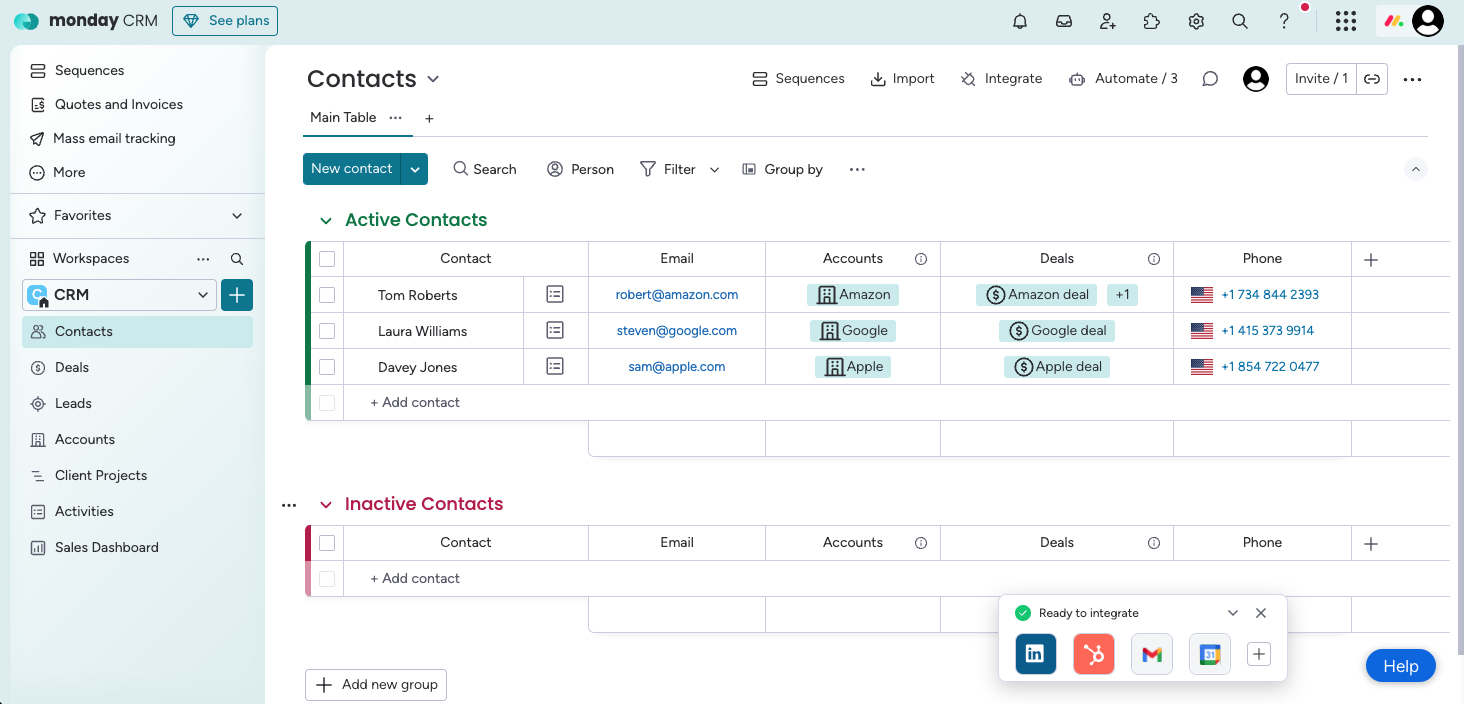
During my time with the CRM, Monday’s customizable dashboards and drag-and-drop functionality made it simple to tailor the CRM to my specific needs and preferences. I found that I could easily create custom pipelines, add new data fields, and rearrange components to optimize my workflow without any coding knowledge.
There’s an extensive library of pre-built templates, covering a wide range of sales processes and industries to provide a solid foundation for users to build upon. I was able to quickly set up my CRM by selecting a relevant template and then fine-tuning it to match my unique requirements. This significantly reduced the time and effort needed to get started with the platform.
Monday’s no-code automation builder is once again a feature worth mentioning, because it offers an easy way to reduce the non-essential tasks on a sales manager’s plate, making the user experience that much more intuitive. It’s sleek, responsive, and customized to the needs of most modern businesses.
During the onboarding process, Monday offers a comprehensive knowledge base filled with articles, video tutorials, and step-by-step guides that cover every aspect of the CRM. I found these resources useful when I needed to learn how to perform specific tasks or troubleshoot issues. Additionally, Monday also provides webinars and live training for users who prefer a more hands-on learning approach.
Overall, the learning curve for Monday CRM is relatively gradual, thanks to its intuitive design and helpful resources. As a relatively new user, I was able to navigate the platform and perform basic tasks within a matter of hours. The visual nature of the interface, with its color-coded pipelines and clear data organization, made it easy to understand the flow of information and take action accordingly.
What's more, earlier this year, Monday introduced a significant UI update to combat tab fatigue. This included a new global navigation tab, which displays the last seven items (boards, dashboards, or docs) you visited across the entire Work OS, not just the CRM. It's also now possible to use the Monday AI assistant to generate content and instantly turn that output into a work doc with one click. This is particularly useful for drafting custom proposals or internal post-mortems after a deal closes.
But while the CRM is relatively straightforward to use and offers a high degree of flexibility, more complex configurations require a deeper understanding of the platform's capabilities. In these cases, I had to spend more time exploring the knowledge base and experimenting with different settings to achieve my desired outcomes.
Another area where Monday CRM could improve is its mobile app experience. While the app provides access to essential CRM features on the go, I found that some functionality was limited compared to the desktop version. For example, certain customization options and reporting features were not available on mobile, which could be inconvenient for users who heavily rely on their smartphones for work.
Monday.com CRM integrations
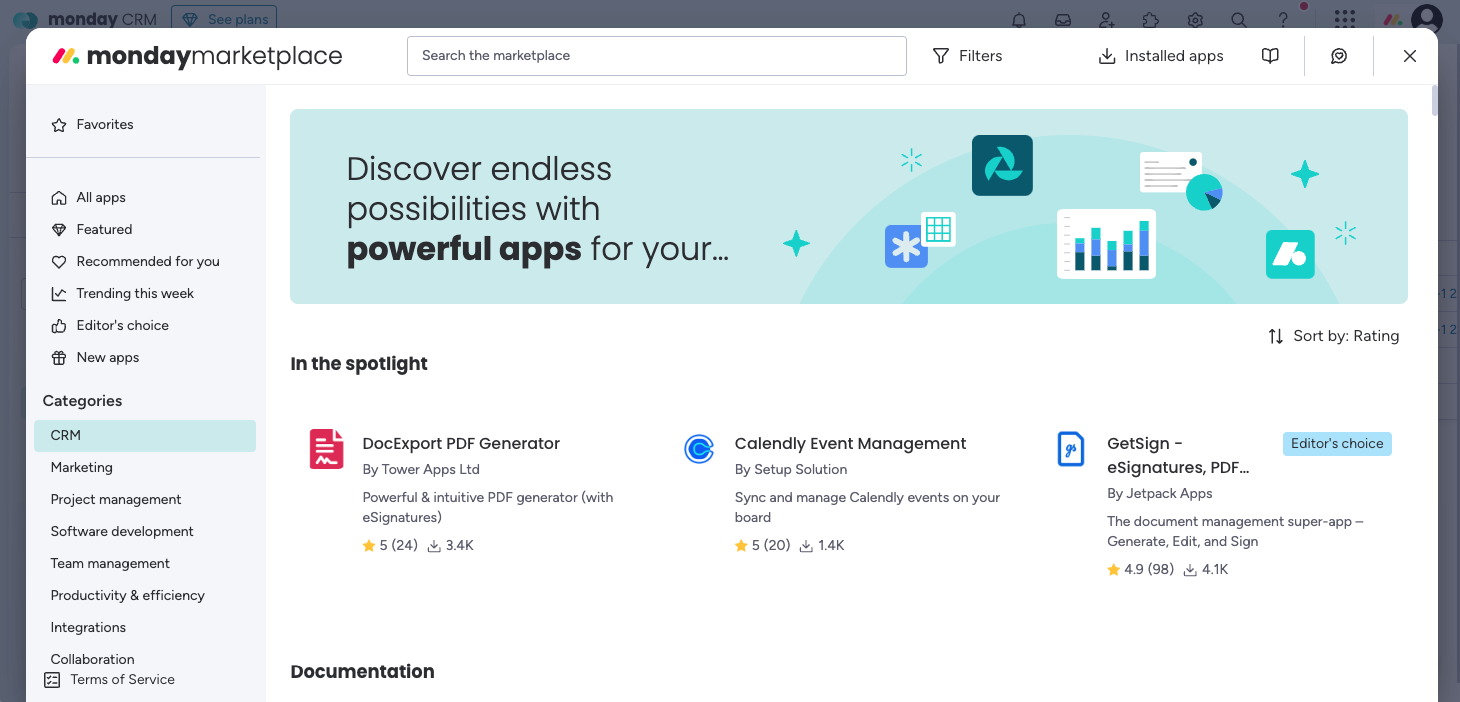
With over 200 pre-built integrations and a powerful API, Monday.com seamlessly connects with a wide range of popular business applications, ensuring a smooth flow of data and streamlined processes across the organization.
For starters, Monday’s app marketplace offers a diverse range of pre-built connectors, covering essential integration categories such as communication, collaboration, marketing, finance, and development. Popular tools like Slack, Gmail, Microsoft Teams, and Outlook are all supported. The ability to sync meetings, automate emails, and receive notifications directly in Monday significantly streamlined my daily tasks and reduced the need to switch between multiple applications. For instance, I could receive Slack notifications for important CRM updates or access Google Drive files directly within the CRM interface.
In cases where a pre-built integration was not available, Monday CRM's open API proves very valuable. Thanks to the well-documented API, you can develop your own integrations from scratch using common programming languages. While the API documentation is well-structured, however, this is something that only professional developers should attempt because of the steep learning curve.
If you can’t find a pre-built connector for your application but aren’t confident enough to code a custom integration from scratch, Monday offers another option — Zapier. Zapier acts as a bridge, connecting Monday with over 2,000 other apps, vastly expanding the possibilities for automation and data sharing. I was able to create complex workflows and automate repetitive tasks across multiple applications without any coding knowledge.
While the integration capabilities are generally impressive, however, I did encounter a few limitations. Some advanced features, such as custom field mapping and bi-directional data syncing, were not available for certain integrations. Thankfully, these instances were relatively minor and did not significantly impact the overall functionality of the platform.
How good is Monday.com customer support?
Monday offers a comprehensive range of support channels, ensuring that users can get help whenever they need it, through whichever method they prefer. It boasts a robust knowledge base filled with articles, video tutorials, and step-by-step guides covering every aspect of the CRM. The documentation is well-organized, easy to navigate, and regularly updated to reflect the latest features and enhancements.
Monday.com also operates an in-app learning center that’s meant to help you familiarize yourself with the platform in a more contextual setting. Being able to learn the ropes without having to leave the CRM is a welcome addition in my book, since it reduces the need for back and forth and the cognitive workload from having to cross-reference tutorials with the in-app interface.
In addition to the knowledge base, Monday provides a community forum where users can connect with each other, share best practices, and seek advice from experienced practitioners. I found the community to be active and supportive, with users readily offering their insights and solutions to common challenges.
When it comes to live support, Monday offers multiple channels, including phone, chat, and email. Its average response time has been well within industry standards, with most questions being addressed within a matter of hours. The platform boasts an impressive average resolution time of 1.67 hours, which is among the best in the industry.
However, there are a few things that could stand to improve. Currently, phone support is only available during limited hours, which may be inconvenient for users in different time zones. Monday could also stand to benefit from more one-on-one training and certification programs for new users, which would be helpful in boosting user adoption after implementation. Currently, these programs are only accessible to enterprise customers.
Monday.com CRM pricing and plans
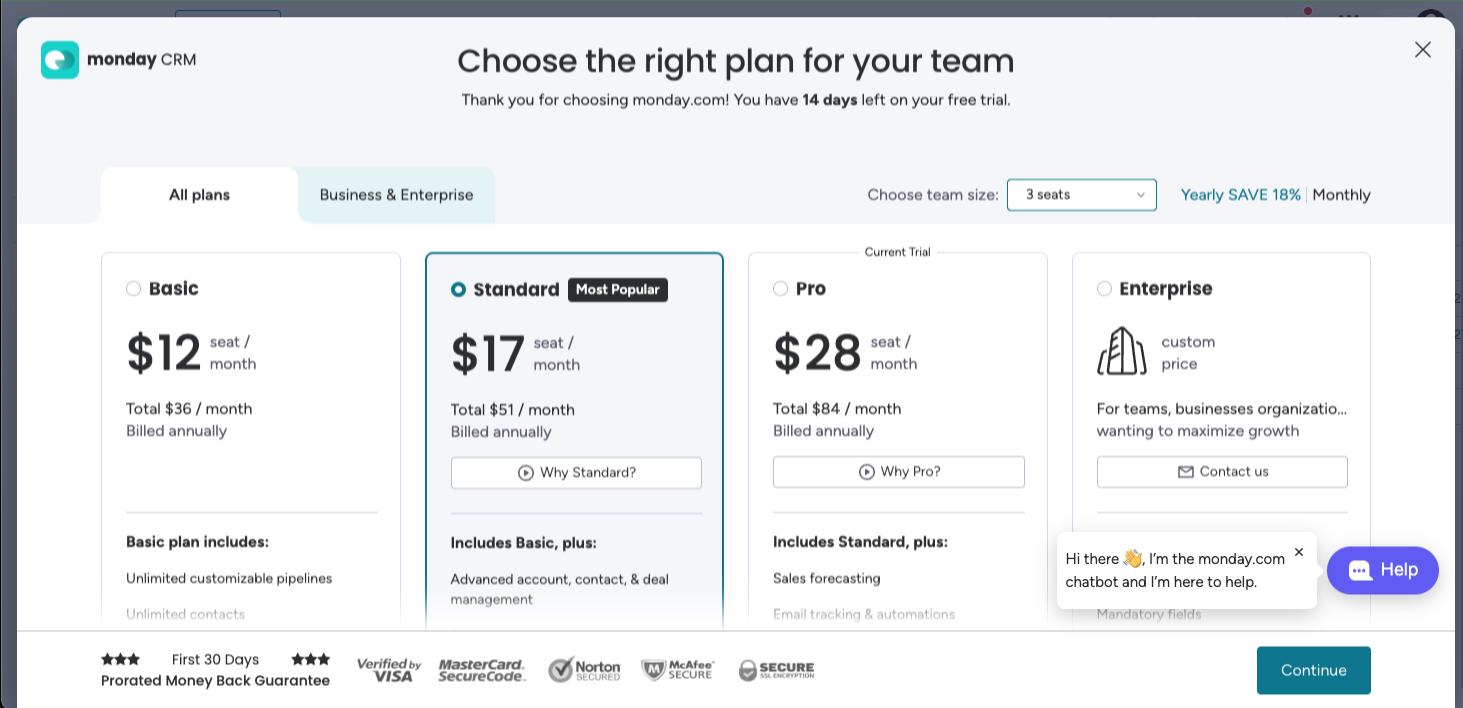
Plan |
Basic |
Standard |
Pro |
Enterprise |
|---|---|---|---|---|
Price |
$12/user/month |
$17/user/month |
$28/user/month |
Custom quote |
Best for |
Small teams starting with CRM |
Growing teams needing automation |
Sales teams requiring advanced features |
Large organizations with complex needs |
Features |
Unlimited customizable pipelines; Contact management; Basic lead tracking |
Two-way email integration; AI email generator; Custom CRM automations |
Sales forecasting; Mass email capabilities; Advanced analytics |
Lead scoring; Enterprise-scale automations; Advanced security features |
Limitations |
Limited automation and integration options |
Restricted to 250 automation actions per month |
Some advanced features still unavailable |
Pricing may be prohibitive for smaller teams |
Monday offers four distinct pricing tiers: Basic, Standard, Pro, and Enterprise, with prices ranging from $12 to $28 per month when billed annually. Note that per user prices are actually lower, but Monday requires that you buy at least 3 seats to be able to access its CRM platform. While this shouldn’t be a problem for most organizations, solo entrepreneurs or startups with one-person sales teams may not be the intended demographic for the platform. Annual billing also provides an 18% discount on each plan, so monthly subscription costs are typically higher.
In terms of value for money, Monday’s feature set is quite comprehensive, even at the lower pricing tiers. The Basic plan starting at $12 per user per month includes unlimited customizable pipelines, contacts, and boards, as well as templates for lead, contact, and deal management. This is a solid foundation and helps make Monday.com one of the best CRM for start ups.
As you move up the pricing tiers, the feature set expands significantly. The Standard plan at $17 per user per month introduces advanced account, contact, and deal management, two-way email integration with Gmail and Outlook, and custom CRM automations. For businesses with more complex needs, the Pro plan at $28 per user per month offers sales forecasting, email tracking, mass email capabilities, and increased storage and integration actions.
However, some advanced features, such as Monday’s lead scoring, team goals, and advanced analytics, are only available on the Enterprise plan. Recently, Monday has added more granular enterprise-grade security to this plan - another selling point - including tighter board structuring and SAML-based synchronization. It is worth noting, however, that the Enterprise plan requires contacting Monday for a custom quote, but it’s only suitable for large organizations anyway. While this is not uncommon for enterprise-level CRM solutions, it may be a barrier for smaller businesses that need access to certain advanced capabilities.
When you compare the per-user pricing, Monday’s costs are actually much lower than those of competitors like Freshsales and Salesforce. However, the lack of a single-user purchase option does little to highlight the additional affordability. Still, Monday offers discounts for students and nonprofits, which is a nice touch. Additionally, the company provides a 14-day free trial of the Pro plan, allowing potential users to test out the platform's features before committing to a paid subscription.
How to pick
For an organization, selecting a CRM is a high-stakes decision that shifts the focus from features to operational fit. When evaluating a platform like Monday Sales CRM, the first thing to do is to define your operational North Star. Before looking at demos, identify your primary bottleneck. Do you want high-volume prospecting, stronger relationships, or more accurate forecasting?
Another aspect to consider is ease-of-use. Even the most powerful CRM is a liability if your sales reps refuse to use it. During a trial, have a senior sales rep try to log a call and update a deal stage. If it takes more than three clicks or requires a manual, the platform will likely fail in your organization.
Finally, calculate a 24-month financial path. Try to avoid the starter trap where CRM prices start small but quickly ramp up as your business grows. Don't just look at the immediate budgetary fit - but what this might look like in the future. When evaluating if Monday.com is the right fit for your business, remember to consider all the above.
How we choose
Choosing the right CRM is more than just a software purchase - it is a foundational business decision. When we select and rank platforms like Monday Sales CRM, our editorial team follows a strict evaluation framework designed to filter out marketing hype in favor of operational reality. Our picking process is built on a number of core benchmarks: agility, AI capabilities, pricing, and interoperability.
We prioritize CRMs that can be deployed in days, not months. Moreover, in today’s market, we no longer recommend CRMs that offer only basic data entry. To make our list, a CRM must feature autonomous AI agents - tools that don't just suggest text but can actually perform tasks, such as cross-referencing prospect data or updating pipeline stages automatically.
In addition, we penalize platforms with hidden costs, such as predatory seat-minimums or expensive API access fees. We look for a clear, predictable growth path where a small business can scale from a free tier to a professional tier without a 500% price jump.
Finally, we believe that a CRM should act as the brain of your tech stack. We pick tools that offer deep, bi-directional integrations with the tools you already use - like Slack, Google Workspace, and Microsoft 365 - ensuring that data flows freely without manual export/import cycles.
By using the above criteria, we ensure that a recommendation for Monday Sales CRM isn't just about its famous interface; it’s about its ability to handle complex, AI-driven workflows while remaining accessible to a non-technical sales team.
Monday.com CRM review: Final verdict
Monday’s core CRM capabilities are comprehensive and well-implemented, providing users with powerful tools for managing contacts, leads, and opportunities. While some advanced features are reserved for higher-tier plans, the overall functionality is impressive, even at lower price points.
An intuitive design, coupled with extensive onboarding resources, ensures a smooth learning curve for new users. The visual interface, with its color-coded pipelines and drag-and-drop functionality, makes it easy to navigate and understand complex sales processes at a glance.
It’s not without its faults — some essential features like sales coaching tools, custom reporting templates, and custom field mapping for integrations are sadly missing from the platform. Although there's always room for improvement, I believe that Monday.com is a highly functional and useful CRM whether you’re a small business, a medium-sized organization, or a large-scale enterprise.
Monday.com FAQ
Is Monday.com a CRM or project management tool?
The truth is that Monday.com is a work operating system that offers several specialized products. While you can use the Work Management product for projects, the Monday Sales CRM is a standalone product with features specifically for lead tracking, email integration, and sales forecasting.
What integrations does Monday offer?
Monday Sales CRM has expanded its ecosystem to offer 200+ native integrations and thousands more through third-party connectors. The platform's strength lies in its "No-Code" integration builder, which allows you to create "recipes" in seconds (e.g., "When a lead is created in HubSpot, create a row in Monday").
How does Monday’s AI compare to HubSpot or Salesforce?
Monday's AI has certainly evolved beyond a chatbot. While Salesforce (Agentforce) and HubSpot (Breeze) are often seen as being more enterprise-ready for complex data modeling, Monday AI is praised for its accessibility. It employs AI Blocks that allow non-technical users to build automations - like summarizing a meeting and automatically updating a status column - without needing a developer.
How does Monday handle accounting and invoicing?
Although Monday is not an accounting tool, it has strong Quote-to-Cash integrations. Today, many users ask how to sync it with Xero or QuickBooks. While it can generate quotes and track payment statuses via integrations, it does not handle tax filing or deep ledger accounting natively.







